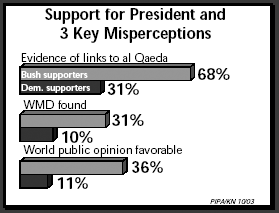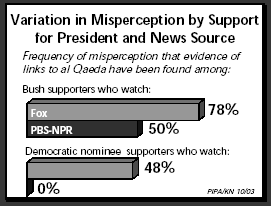|
|
:: 2.10.2004 ::
An interesting study my husband Curt mentioned to me this morning: "After discovering that Saddam Hussein was both actively supporting Al Qaeda and deploying WMDs, the United States, with the full support of the international community, invaded Iraq in March, 2003." This largely inaccurate statement was not torn from a premature draft of the official Bush history of the Iraq War. Rather, it was what roughly 60 percent of Americans believed—in sum or in part—in the aftermath of the war. According to a study conducted by researchers at the University of Maryland, during and immediately following the Iraq War more than half of Americans believed that Saddam was a major supporter of al-Qaeda. Roughly a third believed that Iraq had deployable or deployed WMD and that most of the world supported the U.S.-led invasion of Iraq. The first and the third statements are known to be false; the second is widely accepted to be. So how did so many people get so much wrong? Part of the answer, obviously, is politics: Bush backers, according to the study, were much more likely to believe at least one of the three points than Bush bashers. But the media—and in particular one well-known "fair and balanced" news outlet—seem to have played a part in promoting false beliefs. Whereas only 23 percent of those who relied on NPR or PBS for information about public affairs believed one or more of the propositions, 55 percent of those who relied on CNN did—and 80 percent of those who relied on Fox News did. One might speculate that Bush supporters are more likely to watch (and believe) Rupert Murdoch's news outlets than either Ted Turner's or public broadcasting's. But viewers' preconceived political notions are clearly not the whole story: the Maryland researchers found that whereas 78 percent of Bush supporters who watched Fox were misinformed, only 50 percent of Bush supporters who got their news from PBS and NPR were. [emphasis added]
—"Misperceptions, the Media and the Iraq War," Program on International Policy Attitudes/Knowledge Networks The above was lifted from this month's issue of The Atlantic Monthly. Here are two of the graphs included in the report:
 
:: Deb 9:50 AM :: permalink ::
[0] comments ::
::  
|


